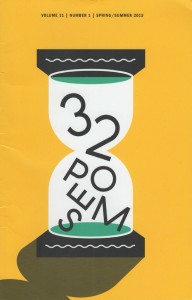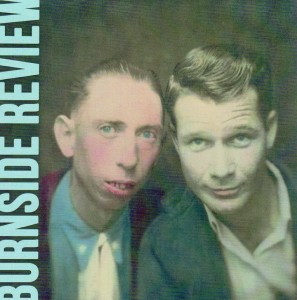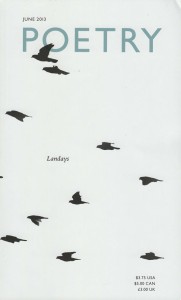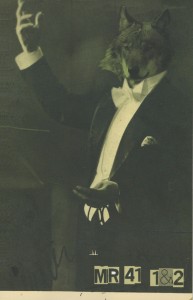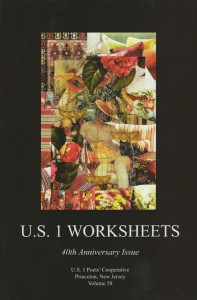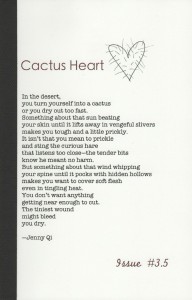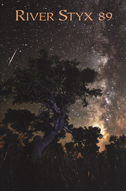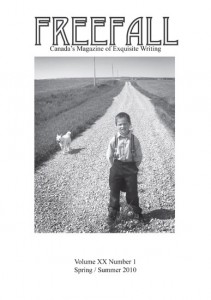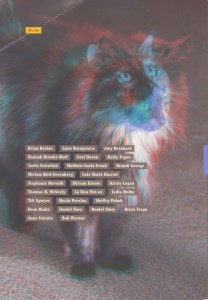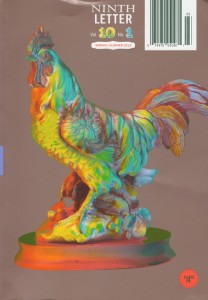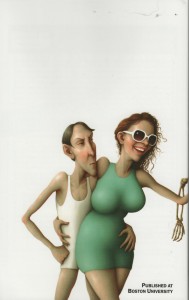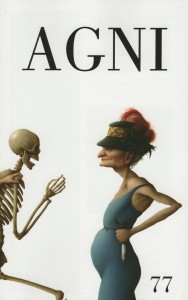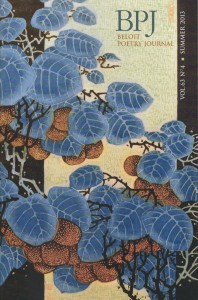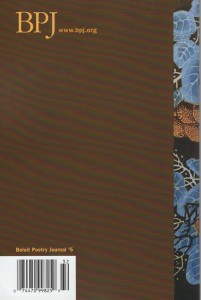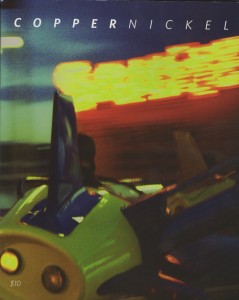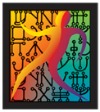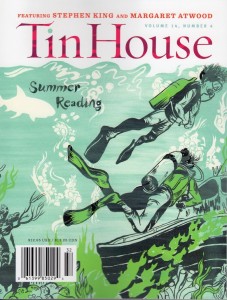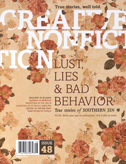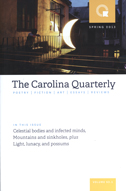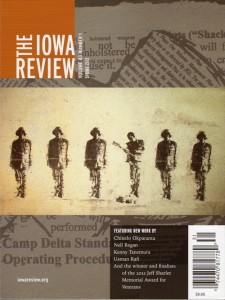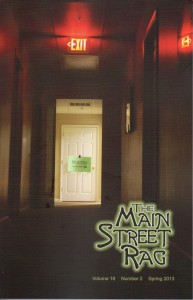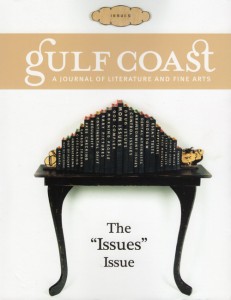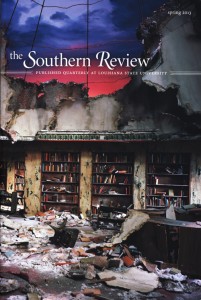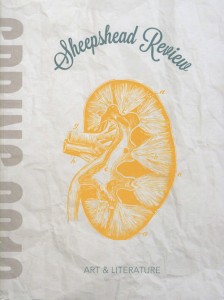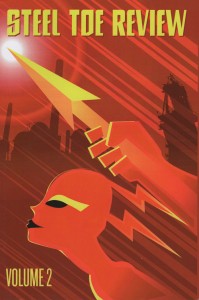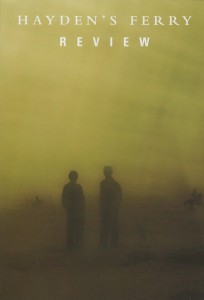A literary, though not a little, magazine, Mandorla is published by the Department of English at Illinois State University in Normal, in collaboration with Southern Methodist University, where its founding editor, Roberto Tejada, is a distinguished professor of art history. Tejada’s interest in interdisciplinary research and synergies infuse the magazine with a focus on the creative process and the synthesis of multiple art forms. This 542-page tome is the 15th issue of the magazine, which started in Mexico in 1991 and has been published yearly under the current aegis since 2004. Continue reading “Mandorla – 2012”
NewPages Blog
At the NewPages Blog readers and writers can catch up with their favorite literary and alternative magazines, independent and university presses, creative writing programs, and writing and literary events. Find new books, new issue announcements, contest winners, and so much more!
Mandorla – 2012
Spread the word!
Moon City Review – 2013
Is it backhanded to say that most of Moon City Review 2013 is promising? The truth is, the issue is eclectic and accessible. The prose narratives tell their stories in a straightforward manner that hold my attention, and the poems leave little doubt as to the image or sentiment they’re driving for. But as I read, I often find myself wishing that many of these pieces had received one more editorial pass: so little separates them from promising to satisfying. Continue reading “Moon City Review – 2013”
Spread the word!
Pleiades – 2013
Possibly every reviewer has made a reference to the Pleiades constellation when reviewing Pleiades: A Journal of New Writing (& Reviews). The connections are hard to miss. Just as the constellation has many stars, some of which shine brighter than others, the journal is a collection of many polished works that resonate even if one has to examine them closely, as if with a telescope. The stars are also known as the Seven Sisters, and here the connection ends, at least for the Winter 2013 issue in which none of the pieces seem to be siblings but perhaps distant cousins of one another, at times a few steps removed. Continue reading “Pleiades – 2013”
Spread the word!
Poetry South – 2012
This issue delivers a lot of interest in relatively few pages by coming at writers from more than one angle. This is particularly effective in the treatment of Carolyn Elkins, a fine poet now living in North Carolina but with roots in the Mississippi Delta, where Poetry South is based. We’re given a generous serving of Elkins’s poetry, seven poems, as well as an interview with her by the magazine’s editor, John Zheng. As a bonus, Zheng discusses three additional poems with the author in some detail and prints the texts in full. Here, all in one place, is an introduction to a poet whose skill and imagination run deep. Continue reading “Poetry South – 2012”
Spread the word!
Radio Silence – April 2013
My first job out of high school was at a small theater that played artistic, foreign, and independent films, but right next door to this theater was a rowdy biker bar. I was always fascinated by the juxtaposition of the theater’s well-to-do patrons of the arts and the leather-clad highway warriors who would sometimes swing by to purchase large tubs of popcorn drenched in butter. Radio Silence, a unique literary journal that blends literature and rock & roll, reminds me of that wonderful cultural clash. In this journal are stories and poems from some of the strongest writers of the previous century and essays that analyze music from influential rock bands and musicians. Continue reading “Radio Silence – April 2013”
Spread the word!
Slice – Spring/Summer 2013
Co-publishers Celia Blue Johnson and Maria Gagliano of Slice magazine want to take a moment of your time to share with you their rabid obsession with literature: “This issue of Slice was designed to interfere with your day. We want you to miss your subway stop because you were too busy turning the pages.” This is no joke, dear reader. Obsession is the theme of this issue and every story, poem, and essay is dangerously addictive to read. Subjects range from the mundane to the insane and every piece of writing is sure to keep your attention as your train passes you by. Continue reading “Slice – Spring/Summer 2013”
Spread the word!
32 Things We Really Should Apologize For
On the back of the current issue of 32 Poems is a playful list of “32 Things We Really Should Apologize For,” written by Aaron Alford and Lauri Anderson Alford. Here are some of the best lines:
2. Touching the belly of a pregnant woman who was not pregnant
4. Watching so many kitten videos on YouTube [Though if you ask me, you don’t have to apologize]
7. Texting something mean about Liz and accidentally sending it to Liz.
19. That time we got on WebMD and diagnosed you with six different diseases.
23. Telling Liz, “It’s fine. No one can tell you’re not wearing a bra.”
29. Standing too close in the supermarket and judging your groceries.
32. Creating an eHarmony profile for Liz without telling her.
All I have to say is, poor Liz.
The rest of the issue features “Chad Davidson, Anna Journey, Amit Majmudar, Caki Wilkinson and nearly two-dozen other poets as fine as you’ll find anywhere.”
Spread the word!
Poster Your Town with Poetry!
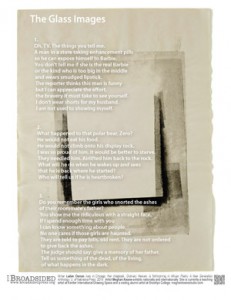 Summer is the perfect time to become a Broadsided Vector!
Summer is the perfect time to become a Broadsided Vector!
Edited by Elizabeth Bradfield, Gabrielle Calvocoressi, Sean Hill, Alexandra Teague, and Mark Temelko, Broadsided has been putting literature in the streets since 2005. Each month, a new broadside is posted both on the website and around the nation.
Writing is chosen through submissions sent to Broadsided. Artists allied with Broadsided are emailed the selected writing. They then “dibs” on what resonates for them and respond visually – sometimes more than one artist will respond offering a selection of broadsides.
The resulting letter-sized pdf is designed to be downloaded and printed by anyone with a computer and printer. The goal is to create something both gorgeous and cheap, to put words and art on the streets.
The site contains a gallery of past broadsides, a map of cities/state/countries that have been broadsided (and where you can add yours), and links to other broadside sites.
Staple guns and duct tape to the ready – time to get your city on the map!
[Pictured: June 2013 “The Glass Images” – Broadsided’s Official 100th Publication! Poem by Ladan Osman; Art by Meghan Keane.]
Spread the word!
New Issue: New Staff at Burnside Review
The twelfth issue of Burnside Review, admits Editor Sid Miller, “marks a departure for the journal,” but this isn’t bad news. “It still feels like a Burnside Review,” Miller writes. “My hope is that it reads like one too.”
So what’s the change? Previous Poetry Editor Bill Bogart transferred to work the new book department, and John Pursley III stepped into the role. “John came into the mix because I like and respect his work,” Miller says. “I suppose John rooted for poems that Bill would not have. I suppose Bill would have rooted for others.” Additionally, this is the first issue with Adam O’Connor Rodriguez as fiction editor. “He too shares our sensibility and has made a big impact on the issue,” Miller says. And in the end, Miller thanks everyone for their hard work, claiming that they are the ones “who make this thing work.”
So what’s in the actual issue? Pieces from Matthew Lippman, Sandra Kohler, Rae Armantrout, Brooklyn Copeland, Melinda Wilson, A.M. O’Malley, Jennifer Chapis, Andrew Michael Roberts, Lauren Hilger, Donald Dunbar, Marlys West, Joseph Mackin, and more.
Spread the word!
Landays in Poetry
The June 2013 issue of Poetry is special; it is entirely devoted to landays, “oral folk couplets that have been composed by and circulated among Afghan women for centuries.” In her introduction to the issue, Guest Editor Eliza Griswold writes that a landay is “an oral and often anonymous scrap of song created by and for mostly illiterate people: the more than twenty million Pashtun women who span the border between Afghanistan and Pakistan.” Here is an example, published on the back cover of the issue:
Seperation, you set fire
in the heart and home of every lover.
Griswold explains that landays are made up of twenty-two syllables in two lines, nine syllables on the first and thirteen on the second. “The poem ends with the sound ‘ma’ or ‘na.’ Sometimes they rhyme, but more often not.” She then goes into a deep history of landays and how they are used today. The issue is worth getting if even for the introduction alone. But I wouldn’t stop reading there; the rest of the issue is filled with moving landays and photographs. It is certainly an issue to have in your collection.
Spread the word!
Archive of the Now: British Innovative Poetry
The Archive of the Now is a digital collection of over 100 poets performing their own work. Based at Queen Mary University of London, it hosts many specially commissioned recordings unavailable anywhere else, all of which can be downloaded free of charge.
Spread the word!
Glimmer Train March Fiction Open Winners :: 2013
Glimmer Train has just chosen the winning stories for their March Fiction Open competition. This competition is held quarterly. Stories generally range from 2000-6000 words, though up to 20,000 is fine. The next Fiction Open will take place in June. Glimmer Train’s monthly submission calendar may be viewed here.
 First place: Melissa R. Sipin, of Alameda, CA, wins $2500 for “Walang Hiya, Brother.” Her story will be published in Issue 92 of Glimmer Train Stories. This is her first story accepted for publication. [Photo credit Joshua Sy.]
First place: Melissa R. Sipin, of Alameda, CA, wins $2500 for “Walang Hiya, Brother.” Her story will be published in Issue 92 of Glimmer Train Stories. This is her first story accepted for publication. [Photo credit Joshua Sy.]
Second place: Elizabeth Genovise, of east Tennessee, wins $1000 for “Us vs. They.”
Third place: Soma Mei Sheng Frazier, of San Leandro, CA, wins $600 for “Charlie Golf, Charlie Golf One.”
A PDF of the Top 25 winners can be found here.
Deadline soon approaching for the Short Story Award for New Writers: May 31.
This competition is held quarterly and is open to all writers whose fiction has not appeared in a print publication with a circulation over 5000. No theme restrictions. Most submissions to this category run 1500-5000 words, but can go up to 12,000. First place prize is $1500. Second/third: $500/$300. Click here for complete guidelines.
Spread the word!
June 2013 Book Reviews
In case you missed them, check out our June issue of book reviews on NewPages. Eleven new books are covered, from poetry and fiction to nonfiction and a poetry/prose cross-genre title. Specific titles include:
- Appetite, poetry from Aaron Smith, University of Pittsburgh Press
- Matters of Record, poetry from Megan Roberts, Finishing Line Press
- Salton Sea, fiction by George McCormick, Noemi Press
- A Palette of Leaves, poetry from Edythe Haendel Schwartz, Mayapple Press
- Work From Memory: In Response to In Search of Lost Time by Marcel Proust, Poetry/Prose by Dan Beachy-Quick and Matthew Goulish, Ahsahta Press
- A Bouquet: of Czech Folktales, poetry by Karel Jarom
Spread the word!
New Lit on the Block :: The Atlas Review
The Atlas Review, a new biannual print journal, has a mission “to extend aesthetic qualities/dilemmas beyond a few communities and into the open air of all voices.” Editor Natalie Eilbert says: “It is our hope that through our anonymous submission system, we can graph a new geography of writers and artists, from Idaho to the Philippines.”
Along with Eilbert, Editors Jillian Kuzma and Dolan Morgan publish poetry, fiction, nonfiction, interviews, and art in the issues. Eilbert says that you can expect to find writers that you can both recognize and admire, noting that you can find interviews with the likes of George Saunders, Amelia Gray, and C. D. Wright.
With a desire to engage as many communities as possible, Atlas Review only accepts submission anonymously. They do, however, also solicit pieces from bigger names to draw a wider audience for readership. “We like the energy this creates,” says Eilbert. “We’d like to think of the magazine as one especially for writers (as if there exists a lit mag whose audience is not writers) by writing letters to our accepted authors articulating just why we were drawn to their submission, being active editors in pieces we enjoy, writing letters of encouragement to writers we find striking but whom we are unable to take in a given reading period, and finding as many opportunities to get our writers involved in reading events, their own communities (we ask, for example, in what bookstores our writers would like to see their work featured), and even the magazine itself (we have “guest readers” for each reading period, former contributors interested in vetting submissions).”
The first issue features poetry by Eileen Myles, Caitlin Dube, Michael Simon, Christopher DeWeese, Justin Boening, Patrick Gaughan, Anna Journey, Joe Hall, Ken L. Walker, Cori A. Winrock, Marci Vogel, Safiya Sinclair, Robert Ostrom, Kathleen Ossip, Brandon Kreitler, Meg Day, Matthew Zingg, Rachel Carstens, and Russ Woods; fiction by Jacob Mercer, Catherine Lacey, Judy Caldwell-Midero, Jon Steinhagen, and Sam Allingham; art by David Michael Schmidt, Bianca Stone, Jenny Harp, Noah and Nathan Rice, Kristof Didrickson, Roxy Drew, and Brett Rees; and an interview with George Saunders.
Right now, the editors are eagerly working on issue 2 as well as some new developments they can’t quite reveal yet. “We’ve got a whole lot of plans for reading events this summer which we cannot wait to declare—like, seriously big plans ahead there and we’re gripping our seats to tell you but must hold on!” Issue 2 will feature work by Italian writer Gabriella Ambrosio (translated by Alastair McEwan), Mike Meginnis, Camille Rankine, Rachel Glaser, Mr. Fish, and interviews with C. D. Wright and Amelia Gray.
Atlas Review accepts submissions through submittable but asks that you remain completely anonymous. Do not include your name or “identity-revealing information” anywhere in your submission. However, they do not have an open submission period at the moment.
Spread the word!
Mississippi Review Contest Winners
The latest Mississippi Review features the winners and finalists of the 2013 Contest:
Fiction Winner
David Armstrong: “Straw Man”
Finalists in Fiction
Emma Duffy-Comparone: “EXUMA”
Tori Malcangio: “Earthlight”
Poetry Winner
Caitlin Cowan: “Half Past”
Finalists in Poetry
Caitlin Cowan: “Cease and Desist”
Lauren Moseley: “A Fine Essence Descending”
Charles Atkinson: “Pleasure, in a Word”
Mike Schneider: “Devil’s Dream”
Audrey Walls: “Unsent Letter to a Young Photographer”
L. S. Klatt: “Amazon”
Chelsea Jennings: “Jennings On the Steps of the Seattle Asian Art Museum”
Elisabeth Murawski: “Light”
Catherine Carter: “Things To Know”
Geffrey Davis: “The Epistemology of Rosemary”
Roger Craik: “Hover Fly”
Charlotte Matthews: “Negative Capability”
Spread the word!
4000 Words 4000 Dead – 2013
4000 Words 4000 Dead & Revolutionary Optimism / An American Elegy: 2006-2012
“In April 2008, I began collecting 4000 words as a memorial to the 4000 dead American soldier who had been killed in Iraq. Submissions came from friends, students, writers, activists, soldiers, and those who read about the project online. I asked each person to send me 1-10 words, gave parts of the poem away to pedestrians during public performances across the country, and painted the words using the American flag as a writing utensil in two installations.” –Jennifer Karmin
4000 Words 4000 Dead is a companion piece to Revolutionary Optimism, a response to Abu Ghraib based on confessions from Iraqi prisoners, sympathy cards, and The Tibetan Book of the Dead. Both texts were published together as a chapbook by Sona Books for Veterans Day 2012 and released online for Memorial Day 2013. More info here.
Spread the word!
Lit Mag Covers :: Picks of the Week
You shouldn’t judge a book by it’s cover, but it doesn’t mean the cover can’t be appealing. Here are a few magazines that came in this week that made me stop to think, say “wow,” or simply announce to my coworkers, “Hey, check out this cover!”
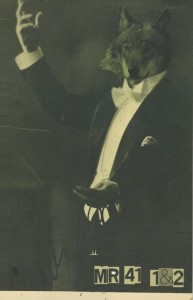 |
| Mississippi Review‘s Summer 2013 cover |
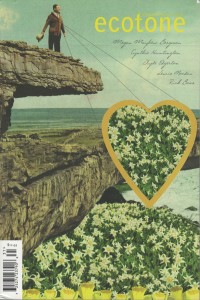 |
| Ecotone‘s Issue 15 cover |
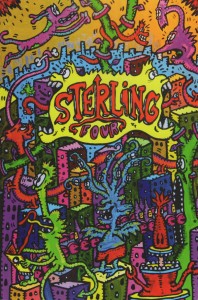 |
| Sterling Number 4 cover |
Spread the word!
U.S. 1 Worksheets 40th Anniversary Issue
Volume 58 marks the 40th Anniversary Issue for U.S. 1 Worksheets and is dedicated to Elizabeth Anne Socolow, “a founding member and friend.” In her editor’s note, Nancy Scott revels over the countless hours that volunteers have put in over the last forty years to make U.S. 1 Worksheets the publication it is today.
“Over time we’ve changed the look of the journal,” she writes, “from the early tabloid to the perfect bound edition today. With each issue we welcome the best writing that comes our way from Cooperative members and from other poets across the country and beyond. As the Cooperative has grown so has the number of poets whom we publish. For the first time we have instituted a membership drive in order to raise the necessary funds to continue U.S. 1 Worksheets as a print publication for another 40 years.”
Spread the word!
Cactus Heart’s First Print Issue
Cactus Heart, an online magazine reviewed on Screen Reading, has just put out their first print issue, featuring work by Carley Besl, Hannah Baker-Siroty, Erica Bodwell, Merina Canyon, Teresa De La Cruz, Pippa Anais Gaubert, Theodosia Henney, Peycho Kanev, Jay Logan Lance, Victoria G. Martinez, Michael Metivier, Anne Britting Oleson, Jenny Qi, Stephen V. Ramey, Alison Reed, Eboni Sade’, Karissa Knox Sorrell, Yong Takahashi, Sylvain Verstricht, Eric Werner, and Matthew Woodman.
Spread the word!
Schlafly Beer Micro-Brew Micro-Fiction Contest Winners
River Styx #89 features the winners of the 2013 River Styx Schlafly Beer Micro-Brew Micro-Fiction Contest. I read several of the pieces, and I think you should definitely look into reading them too:
1st Place Ben Hoffman, “Your Baby’s Mother”
2nd Place Claire Guyton, “High Water”
3rd Place Justin Herrmann, “Blue Star”
Honorable Mentions
Amanda Churchill, “What We Learned While Tending Coop”
Gary Leising, “Heart Scar”
Lee Reilly, “A Fair Exchange”
Spread the word!
FreeFall Contest Winners
The new issue of FreeFall magazine features the winners of the 2012 Annual Prose & Poetry Contest:
POETRY
1st Place: blue and white pottery by Ulrike Narwani
2nd Place: Bioluminescent Bay by Laboni Islam
3rd Place: At 15 by dee Hobsbawn-Smith
Honourable Mention: Marguerite by Juleta Severson-Baker
PROSE
1st Place: The Scream by Chase Baird
2nd Place: Hanging Clothes by Beth Everest
3rd Place: Myths of Mutton Busting by Natalie Meisner
Spread the word!
Art Education
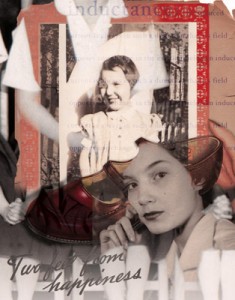 |
| Induction (2001-2002) Image courtesy of http://www.stillpointartgallery.com/ |
Artist Julie A. Struck writes, “So, why are you compelled to make art, she asks, and I shock myself by quite honestly answering—because my mother never wanted me to.” She goes on to say that although her mother was an artist herself, she never praised Struck for her artistic skills: “I always felt that art was an avenue forbidden to me because it was exclusively hers.” But this only pushes her forward.
In a piece in the current issue of Still Point Arts Quarterly, Struck writes about her struggles with her family and pursuit for an education in art. “My family, especially my mother, continue to function as endless subject matter for my creative productions,” she says. “It is the only support my mother ever gave me, along with passing on her innate artistic talent. However, not one of y eight siblings, let alone my mother, ever asks me about my artwork or my long, difficult career in teaching art at the college level. It doesn’t stop me from making art, or teaching, however. In fact, without the familiar familial opposition, especially my mother’s, I suspect i would never make any art. Or write this.”
Struck’s art also appears in this issue, honoring her with the award for Best Three-Dimensional or Mixed-Media Artwork. Also included in this issue of Still Point are portfolios by Gary Enge, Ronnj Medini, Leslie Parke, and Jill Valliere; features by Monica Nawrocki, Laurie Schreiber, and Christina Tang-Bernas; and poetry by Lilace Mellin Guignard, Margôt Maddison-MacFadyen, and Judith Sornberger.
Spread the word!
Lit Mag Covers :: Picks of the Week
You shouldn’t judge a book by it’s cover, but it doesn’t mean the cover can’t be appealing. Here are a few magazines that came in this week that made me stop to think, say “wow,” or simply announce to my coworkers, “Hey, check out this cover!”
I simply had to include both the front and back cover of the volume 10 year of Ninth Letter. The cover perfectly captures the quirky and fun issue, filled with all sorts of goodies. Plus: cat. Meow.
Well, actually I have to include both the front and back of AGNI also. Here are the details: Fabio D’Aroma, Retrochrionica, 2011, oil on canvas, 30″ x 56″
And I guess while I’m at it, I should include the front and back of Beloit Poetry Journal as well. This was actually Casey’s pick, but I have to agree with him here.
Spread the word!
Dedicated to Jake Adam York
The current issue of Copper Nickel is being dedicated to Jake Adam York, the founding and managing editor of the magazine that passed away suddenly in December of 2012 at the age of forty. “Copper Nickel was a confluence of Jake’s talents as a poet, teacher, and editor,” write the editors. “As a poet, Jake cherished the persistence of the human voice, especially in times of great duress and crisis. One could say that the journal, for Jake, was a physical manifestation of a chorus of voices, all singing different songs, sometimes in wildly different tempos and styles, but all in the name of literary art. As a teacher, Jake lived to inspire others, and he loved to watch the steady build of enthusiasm as a student discovered the unique gifts and responsibilities of the work of the literary editor. Jake’s own editorial work in particular clearly brought him profound joy. Whenever an issue gradually began to take shape, his excitement at the prospect of bringing a carefully-curated collection of writing into the world was palpable . . . We miss him dearly.”
The issue features the work of Laura Adamczyk, Margaret Bashaar, Sean Thomas Dougherty, James Flaherty, Roxane Gay, Meredith Herndon, W. Todd Kaneko, Sandy Longhorn, Natalie Mesnard, Jason Myers, Rebecca Nison, Kate Reed, Austin Segrest, Siolo Thompson, and many more.
Spread the word!
Appetite
Appetite, Aaron Smith’s second full-length poetry collection, is wide-ranging, unapologetic, and clever. Its five sections all include references to gay experience, but many poems also focus on popular culture—particularly film—as well as many other topics. The book’s title implies a desire for something, but to me, the dominant emotion of the collection is loneliness; this is not a bad thing, however, and Smith offers the reader a beautiful, thought-provoking journey through many facets of his speaker’s life. Continue reading “Appetite”
Spread the word!
Matters of Record
The nineteen poems that make up Megan Roberts’s chapbook, Matters of Record, combine to offer readers a compelling narrative portrait of the lives of women and girls executed in the United States across a wide span of time (the earliest execution takes place in 1860, while the most recent is dated 2005). The book opens with an epigraph taken from Jean-Paul Sartre: “I say a murder is abstract. You pull the trigger and after that you do not understand anything that happens.” And in most of these poems, the murder itself does indeed remain abstract. Even the more graphically violent pieces, such as the eponymous “Matters of Record,” which describes how a young girl was “seven when whipped / to death and the scars / was tortured with a red hot poker,” does so with a curious sense of remove. The violence occurs in the passive voice, and the poem focuses on the young victim rather than on the perpetrator of the violence. Continue reading “Matters of Record”
Spread the word!
Salton Sea
In this collection, interstate highways are stoned with sad songs, while accelerating on The Stones. They speed towards motel rooms and roadside bars, sweaty in premonitions of tomorrows through the Mojave Desert, or swanky Palm Springs hanging out on tan lines and glamour that might turn off George McCormick’s characters. His are not L.A. types, hoping for alternatives to traffic jams, smog, or specters of road rage. But they are not rural either; they are somewhere in between, suspended in that vast space girdled by truck stops, railroads, dry landscapes, and coffee refills on Sunset Boulevard, before accelerating the 101 or I-5 towards midnight and beyond. They take anything outside the nine-to-five hustle, anything stable, to support a family, a budding romance, or dreams that might wake, glimmering, in their baby daughter’s eyes. Continue reading “Salton Sea”
Spread the word!
A Palette of Leaves
Edythe Haendel Schwartz skillfully employs ekphrastic poetry in her second collection, A Palette of Leaves. Through describing and responding to artists and their art—conception, process, and result—Haendel Schwartz focuses on the interplay of art forms in the face of tragedy, emphasizing a need for the written and the visual to interact. Divided into three substantial sections, the collection reads as events always in the middle of an action, adhering to process and memory rather than finality. While the mostly narrative forms vary from neatly organized, consistent lines to ones swaying across the page, these poems remain closely tied to the tangible things held onto through life. Continue reading “A Palette of Leaves”
Spread the word!
Work from Memory
I’ve never read the work of Marcel Proust. Although I’ve always understood Proust to be an author everybody should read, I simply haven’t gotten around to doing so myself. This gap in my reading is admittedly a mild embarrassment, especially as I often find myself the antagonistic provocateur busily berating friends and associates over authors and key texts which they absolutely must read. Much more generous than I, Dan Beachy-Quick’s and Matthew Goulish’s Work from Memory doesn’t berate the reader for any lack of familiarity with its source text. Even without firsthand awareness of Proust’s work, there’s plenty to chew on here concerning reading, memory, ideas of “the book,” and how conscious or not we as readers remain in relation to ongoing and past experience. My understanding is that Proust sought to set down in writing the details of everyday life in as exact, excruciating detail as possible—not the bustling activities with which our lives are ever busily preoccupied, but rather the minutiae of time’s passing, or as Goulish phrases it, “the book project of a life.” Or as Beachy-Quick describes Proust’s protagonist: “The writer dreams of the book as a life.” Work from Memory turns round and round these themes. Continue reading “Work from Memory”
Spread the word!
A Bouquet
It’s hard to imagine a more powerful and enduring genre than the folk tale. Few other literary types so completely cut across culture and time, artfully explicating the moral drama of humanity through stories and characters. While elements of particular folk tales are clearly specific to a singular culture, the narrative elements and arcs highlight a morphology of structure that demands engagement as it highlights a broader pattern. Indeed, in the space between folk tale, myth, and meaning lies the spectrum of the human condition—the foibles, the pettiness, but also the redemption. Undeniably, the folk tale operates in the collective cultural conciseness and history, demonstrating anthropologist Claude Levi-Strauss’s point that “I therefore claim to show, not how men think in myths, but how myths operate in men’s minds without their being aware of the fact.” A Bouquet: of Czech Folktales by Karel Jaromír Erben is no exception. Continue reading “A Bouquet”
Spread the word!
I’ll Drown My Book
As an art school grad, I’ve spent my fair share of time staring at objects in galleries wondering about the artist’s intent. While I of course had my own experience with each piece of art, it was worthwhile to know that the pile of bones at the MCA was not a general memento mori but a statement about U. S. policies regarding “extraordinary rendition.” Frequently, I’ve thought that the idea behind the art was interesting, but the execution was unsuccessful, or even unnecessary. Rosemarie Waldrop, in the statement following her contribution to Les Figues Press’s I’ll Drown My Book: Conceptual Writing by Women, makes the claim that this frame is an inaccurate description of the work of conceptual writers. Unlike visual or time artists who leave their sensuous medium for the intellectual exercise of writing, Waldrop’s conceptual writing focuses more on the sensual than writing from other movements. She focuses on the “shape” and sound of words, the experience of the word itself rather than its use as signifier. Further, unlike artists in other meanings, there is no “optional execution”; one either erases words from a canonical text, or one does not. Continue reading “I’ll Drown My Book”
Spread the word!
Bad Sex on Speed
Jerry Stahl’s new novel, Bad Sex on Speed, represents an evolutionary step in his prose style. It’s a bit like the jump William Burroughs made from his straightforward first novel, Junky, to his famous and less conventional masterpiece Naked Lunch. Stahl has written a book attempting to match his words to the hallucinatory state of mind of an amphetamine user wafting through a state of psychosis. It’s spooky, the way he morphs into the minds of his crumbling characters. This is a narrative born, I suspect, from experience, but who knew Stahl swung this way? Readers of his oeuvre will be familiar with his narcotic portraits and episodes of heroin, the very opposite end of the spectrum from the territory he explores in this novel. This book’s Library of Congress classification will still fall under the general heading of “drug abuse,” but you won’t find much nodding in this story line, though you may wish a few of the characters within would catch a few hours of sleep. Continue reading “Bad Sex on Speed”
Spread the word!
That Mad Game
That Mad Game: Growing Up in a Warzone is a collection of personal essays from adults who survived childhood in various warzones around the globe. As much as this is a collection of stories about the atrocities of war, it is also, and maybe even more so, a collection of stories of hope for peace. Alia Yunis, in his examination of the Israel-Palestine conflict, comments: “A child can flee the war . . . or the war can stop. But in most cases, children become the adult voices in the background soundtrack of a new generation’s war.” Continue reading “That Mad Game”
Spread the word!
The Rose Metal Press Field Guide to Writing Flash Nonfiction
Rose Metal Press’s respected Field Guide series serves a literary need by focusing on less covered genres, such as flash fiction, prose poetry, and now, flash nonfiction. The press’s most recent addition to the series, The Field Guide to Writing Flash Nonfiction, provides a number of examples of elegant flash nonfiction pieces, as well as context for thinking about the form. Continue reading “The Rose Metal Press Field Guide to Writing Flash Nonfiction”
Spread the word!
Keeping Time with Blue Hyacinths
In Keeping Time with Blue Hyacinths, Sholeh Wolpé meditates on loss through succinct, tightly crafted lyric poems. Divided into four sections that call back to one another, Wolpé’s second poetry collection garners strength from its devotion to the quietude and magnitude of simple, clean lines with poignant yet oftentimes harsh imagery. With a keen understanding of how to create startling images, Wolpé provides access to a wider array of readers wishing to gain insight from these poems’ emotional clarity and depth. Although the majority of these poems are brief, their impression lasts. Continue reading “Keeping Time with Blue Hyacinths”
Spread the word!
New Podcast :: Tiferet Talk
Tiferet Talk, the blogtalk radio show for TIFERET: A Journal of Spiritual Literature, seeks to aid the journal’s mission of promoting peace in the individual and in the world through writing. Their monthly program interviews writers and religious and spiritual leaders about topics relevant to these goals. The host for this program is Melissa Studdard, contributing editor of TIFERET.
Tiferet Talk interviews of 2013 include Judith Hanson Lasater, Julie Maloney, Natalie Goldberg, Helene Cardona and John FitzGerald, Molly Peacock, and upcoming shows Jane Hirshfield 6/17, Doug Anderson 7/29, Ann Hood 8/19, Andrea Polard 9/30, Alfred Corn 10/21, Jim Hanson 11/25, Kanta Bosniak 12/16.
All episodes are available live (times for each show on the site) and past shows are available for free on iTunes.
Spread the word!
Robert Walser’s “dramolets”
Conjunction‘s 60th issue features a special section of three previously untranslated “dramolets” by Robert Walser. “Walter, who personally knew more than most about loss and absence,” writes Bradford Morrow, “is seen here in a fresh light thanks to Daniele Pantano and James Reidel’s deft translations . . . I believe that readers who already admire Walser’s vision and achievement will find his remarkable plays a cause for celebration.”
The issue, titled “In Absentia,” is all about “Things Gone Missing. People vanished or changed beyond recognition. A once-bedrock belief now so alien as not to seem believable anymore. A woman’s threat of suicide. A man’s phantom limb. Another who comes home from prison only to find that home is no longer what it was, friends no longer who they were. Love gained, love lost. A promise forgotten. A couple gone off the grid into the woods and ghost-plagued madness. An exceptionally ill-timed death…”
The issue features the work of Joyce Carol Oates, Lucy Ives, Brian Evenson, Yannick Murphy, G. C. Waldrep, Robert Olen Butler, Miranda Mellis, Robert Coover, and many more.
Spread the word!
New Podcast :: All Write Already!
All Write Already! is a “completely unpretentious” literary podcast hosted by Karen Shimmin and Willy Nast, with episodes posted on the second and fourth Wednesday of every month and available free on iTunes.
Each 30-40 minutes episode features a reading and interview with a guest writer. Past guests have included Shannon Cason, Stephen Markley, Alyson Lyon, David Stuart MacLean, Samantha Irby, Adam McOmber, Claire Zulkey, Christine Sneed, Randy Richardson, Jen Bosworth, Patricia Ann McNair, Keith Ecker, James Finn Garner, Amina Gautier, J.W. Basilo, Samula Park, and Rebecca Makkai.
Each episode also includes topical discussions, such as The Secrets of Successful Blogs, The People Who Actually Read Your Query Letters, The Return of Short Story Collections, The View from the Slush Pile, Your Brain on Paper vs. Screen and lots more.
“All Write Already!” says Nast, “is for writers, readers, or anyone who likes a good story.”
Spread the word!
Writers 57 and Over
Nimrod International Journal‘s current issue is dedicated to writers that are ages 57 and older and is called “Lasting Matters.” Francine Ringold writes in her editor’s note, “Good words are always lasting, so are good people. They last in our memory and on the page. But why 57? Amazing as it may seem to those who know the typical history of ‘lit mags’ (2 to 10 years at most), this fall 2013 Nimrod International Journal will be celebrating its 57th year of continuous publication. With the guidance and dedication of our advisory and editorial boards, Nimrod promises to last another 57 years or more.
The issue features poetry, fiction, and creative nonfiction by Ted Kooser, Stephen Dunn, Lorna Crozier, Ron Wallace, Jennifer Compton, Ivy Dempsey, Harry Humes, Jean Esteve, Jeff Gundy, Roberta Murphy, CJ Muchhala, Vince Sgambati, Lee Sharkey, Anita Skeen, Lilvia Soto, Mary Lee Wladrom, Jack Wolfteich, and more.
Spread the word!
Margaret Atwood Interview
“I believe women are human beings. Pretty radical, that. I don’t believe women are angels, or that every woman is morally superior to every man . . . Women come in as many different varieties as men do, and are as subject to circumstance.” This writes Margaret Atwood in an interview with Elissa Schappell featured in the summer issue of Tin House. This was in response to Shrappell’s question, “Do you consider yourself a feminist writer? Is it possible to be a writer and a feminist, without being a feminist writer?” Atwood says that when using terms such as “Christian writer” or “Communist writer” or “feminist writer,” people often “flounder around” for an answer as to what the terms mean. “So how can you put up your hand for something that is so fuzzy in the minds of those who are asking the question?”
In the interview, Atwood discusses female characters, speculative fiction, political bias, writer’s “moral obligation to society,” and her forthcoming book MaddAdam as the third book in a trilogy.
The Summer Reading issue of Tin House also includes a new story by Stephen King, two new poems by Tom Sleigh, pieces by Katie Arnold-Ratliff, Jennifer Gilmore, and Jodi Angel, and more.
Spread the word!
Lust, Lies, & Bad Behavior
“Lust, Lies, & Bad Behavior: True stories of Southern Sin” is the title for the current issue of Creative Nonfiction. The issue includes the winner of the Creative Nonfiction “Southern Sin” Essay Prize, sponsored by Neil White and awarded to Harrison Scott Key for “The Wishbone.” Editor Lee Gutkind writes, “I hope that all of the essays in this special issue will intrigue and titillate you—but Key’s is also wickedly funny.”
In the back of the issue is a list of titles from submissions not published but ones that the editors couldn’t help but share. You’ll need to get the issue to delight in all of them, but here are a couple of our favorites:
“Glory, Glory Hole-elujah” (Lust)
“Yankee Hanky-Panky” (Lust)
“Dr. Sin Learns to Bake Biscuits” (Gluttony)
“Baby Jesus and a Waffle House Drunk” (Gluttony)
“All Tomatoes Are Rotten in My Book” (Wrath)
“Squirrels!” (Wrath)
“Long Mustaches and Decorated Horses” (Wrath)
“Granny’s Little Sinner” (Pride)
“Hell Has an Exit” (Pride)
Spread the word!
Carolina Quarterly’s New Look
Because 2013 marks Carolina Quarterly‘s 65th year publishing, the editors decided it was time for a (minor) makeover. With the Spring 2013 issue, the magazine has a “crisp interior layout and sharp new cover.” Instead of an image taking up the whole background of the cover, the new cover features an image in the top third of the cover with a lot more white space on the bottom. It also features a short blurb about “In this issue.” The inside has a new attractive font and some of the masthead and table of contents page vary a little, but the same general layout applies.
In this particular issue you will find “Celestial bodies and infected minds, Mountains and sinkholes, plus Light, lunacy, and possums.” Featured writers include Carolina R. Antich, Rebecca Bagget, Marc Berley, John F. Buckley, Sarah Carey, Jack Christian, Eli Connaughton, Matthew Gavin Frank, Krystin Gollihue, Aaron Hamburger, Suzanne Marie Hopcroft, Mary Karr, Dale Roche-Lebrec, Michael Martin, Amyisla McCombie, Corrina Rosendhal, Elliot Sanders, Russel Swensen, Leonid Tishkov, Gemini Wahhaj, and more.
Spread the word!
Sarah McNally “Downright Batty”
Canadian radio reporter David Gutnick has put together both a radio report and web story on 28-year-old Sarah McNally, whose parents founded McNally-Robinson, one of Canada’s largest independent bookstores. Sarah McNally opened The McNally-Jackson Store in New York, a store that supplies home businesses with “Goods for The Study.” This is McNally’s second business venture, her first a bookstore in Soho. Gutnick interviews McNally and a number of customers and employees in his 19-minute radio documentary: Sarah McNally, “Another Hipster In The Business: God Help Me.” It’s wonderful to hear McNally’s perspective on “the reading life,” how she started her bookstore in the wake of many other indie closings, and how she doesn’t feel Amazon is her competitor since what she offers is the human experience we can’t get online. The hipster quote, by the way, is from McNally herself.
Spread the word!
Veterans Award
The Jeff Sharlet Memorial Award for Veterans, hosted by The Iowa Review and made possible by a donation from the family of Jeff Sharlet (1942-69), placed $1000 into the hands of Hugh Martin, winner for his poems “Foot Patrol,” “Intravenous,” “Nocturne with IED,” “Ares,” “Winter, Kurdistan,” “The Neck in Front of You,” “Test Fire,” “The Tunnel at Red Creek,” “Memorial Day,” “Lieutenant Graves at La Bourse,” and “Operation New Dawn.” All of these poems are included in the Spring 2013 issue of The Iowa Review, as are selected poems from finalists Cole Becher, Nathan Bradley, Terry Hertzler, Brock Michael Jones, O.A. Lindsey, Philip Tate, Jonathan Travelstead, S. Brady Tucker, Lindsey Waterman, and Michael White. The magazine thanks the judge, Robert Olen Butler, and the family for donating the prize money.
Spread the word!
The “Issues” Issue
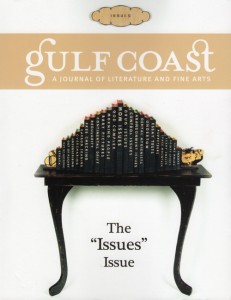 Gulf Coast’s newest issue is all about issues, as cleverly illustrated on the cover with an image of a table lined with books with different titles: Scary Smells, Essay Tests, Regularity, Morning People, Control Issues, God Complex, Drug Issues, and in the middle as the tallest book, Mom Issues. “Most literary journals announce their themes in advance,” write the editors. “Here at Gulf Coast we’re partial to themes that announce themselves gradually. Such was the case with the ‘Issues’ Issue. The cover was what clinched it.”
Gulf Coast’s newest issue is all about issues, as cleverly illustrated on the cover with an image of a table lined with books with different titles: Scary Smells, Essay Tests, Regularity, Morning People, Control Issues, God Complex, Drug Issues, and in the middle as the tallest book, Mom Issues. “Most literary journals announce their themes in advance,” write the editors. “Here at Gulf Coast we’re partial to themes that announce themselves gradually. Such was the case with the ‘Issues’ Issue. The cover was what clinched it.”
And on top of the revealed themes in the fiction, nonfiction, and poetry sections, the issue also contains the winning pieces from the 2012 Barthelme Prizes:
Winner
Josie Sigler: “The Compartment”
Honorable Mentions
John Longo: “The Only Thing We Argue About Is Time Travel”
Emma Copley Eisenberg: “There Was”
Spread the word!
Lit Mag Covers: Picks of the Week
You shouldn’t judge a book by it’s cover, but it doesn’t mean the cover can’t be appealing. Here are a few magazines that came in this week that made me stop to think, say “wow,” or simply announce to my coworkers, “Hey, check out this cover!”
Main Street Rag‘s new cover features a hallway, and at the end, there is an exit sign, pointing left and a sign below indicating poetry is to the right (pointing, of course, to where you must open the journal). Which way will you choose?
Gulf Coast‘s “Issues” cover features a selection of books of issues: Oversharing, Essay Tests, Abandonment Issues, God Complex, Drug Issues, Control Issues, and, largest and dead center, Mom Issues.
The Southern Review‘s cover features a library, taken over by disaster, with the dome of the ceiling ripped out to reveal a beautiful skyline.
Spread the word!
The Body Parts of Sheepshead Review
The current issue of Sheepshead Review features an illustration of a liver on its cover. In the editor’s note, Kelsey DuQuaine explains that, “This semester’s theme reflects the process the journal goes through in choosing these pieces.” The layout editor, Jake Jenkins, brought the idea of body parts to the table. The kidney on the cover represents the way in which the staff filters the writing for selection in the magazine. Then, each section inside features a different body part: lungs for Prose (“that breathe life into the stories we tell”), a beating heart for Poetry (“symbolizes the emotion and passion”), an eye for Visual Arts, and a stomach for the special Eat Up! section.
This issue also features the two winning poems for the Rising Phoenix Award, selected by Sarah Busse and Wendy Vardaman. In the judges comments, they write, “When you ask two poets to judge a contest, you may well end up with two poems selected. In our case, this is not because we each championed one and refused to compromise, but because we agreed that the two poems featured here represent very different voices and choices. By selecting them both as winners, we can highlight their comparative strengths and more clearly demonstrate through contrast what tools we poets have at our disposal, and what decisions go int o writing a poem.” The two winners are Mitchell Sabez with “You See the Hut Yet You Ask ‘Where Shall I Go for Shelter?'” and Jake Jenkins for “Kentucky Chase.”
Spread the word!
Steel Toe Review Print Volume
The online magazine Steel Toe Review has just put out volume 2 of their print series. Some of the best work they published online in 2012 is featured in this issue. It also features never-before-published illustrations. “Our mission has evolved over time, and it may seem contradictory to an outsider,” writes M. David Hornbuckle in the editor’s note. “We call ourselves a journal of contemporary Southern arts and literature, but what we publish often extends well beyond the Mason-Dixon line. Ideally, we think of ourselves as a bridge to connect the established with the new, the traditional with the experimental, and the Southern with (not just the Northern, but) the world without borders. Our home is Birmingham, Alabama, in a sense, but it is also the internet, and in every literal and metaphorical sense, the internet is about making connections. And so that is what we do.”
Spread the word!
Interview with Jake Adam York
The current issue of Hayden’s Ferry Review contains a short interview with Jake Adam York, author of Persons Unknown which contributes “to the dialogue surrounding the development, and launch, of the Civil Rights Movement.” Jake Adler had interviewed in in November 2012 as part of a class assignment through email. And in his introduction to the interview, Adler states, “Dr. York commemorates, and pays homage to, the tragic lives which suffered at the hands of ignorance and oppression by highlighting the simple and preposterous cause for all of the hate and violence that has endured: race. It doesn’t matter who writes this poetry, I learned, but that they write it in the first place. . . Dr. York was one of those rare, champion poets who knew what his voice was, what it needed to say and how it needed [to] say it. . . He deserves the utmost recognition and marked celebration.” In five questions, the interview discusses York’s writings, his choices in writing, and his inspirations for beginning work on Persons Unknown.
Spread the word!
RHINO Editors’ Prizes 2013
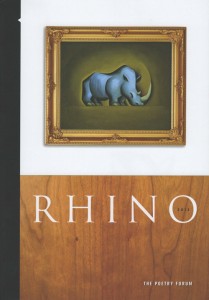 RHINO‘s 2013 issue features the winners of the Editors’ Prizes for 2013:
RHINO‘s 2013 issue features the winners of the Editors’ Prizes for 2013:
First Prize: Rodney Gomez – “Drag Racer”
Second Prize: Kristin Robertson – “Hyoid Bone”
Honorable Mention: Claudia Cortese – “Lucy tells the boy to suck”
The issue also features work from Anne Barngrover, Kathleen Boyle, Jeff Burt, Sean Howard, Liz Kay, Sophie Klahr, Gail Martin, Adam McGee, Matthew Murrey, Jeff Oaks, Rikki Santer, Sara Talpos, Sidney Thompson, Bill Yarrow, and many more. To see the full Table of Contents, please visit RHINO‘s website.

